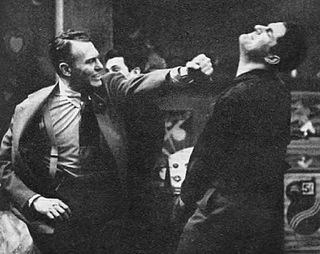Hollywood Screen Test is an American talent show that aired on ABC from 1948 to 1953. This program holds the distinction as the first regularly broadcast television series by the American Broadcasting Company.

Robert Wesley Addy was an American actor of stage, television, and film.

Elliott Lewis was an American actor, writer, producer, and director who worked in radio and television during the 20th century. He was known for his ability to work in these capacities across all genres during the golden age of radio, which earned him the nickname "Mr. Radio". Later in life, he wrote a series of detective novels.

Man Against Crime starring Ralph Bellamy, one of the first television programs about private eyes, ran on CBS, the DuMont Television Network and NBC from October 7, 1949, to June 27, 1954, and was briefly revived, starring Frank Lovejoy, during 1956. The show was created by Lawrence Klee and was broadcast live until 1952. The series was one of the few television programs ever to have been simulcast on more than one network: the program aired on both NBC and DuMont during the 1953–54 television season.
Front Page Detective is an American crime drama series which aired on the DuMont Television Network on Fridays at 9:30 p.m. ET from July 6, 1951, to September 19, 1952, and in October and November 1953. The program was then in broadcast syndication for several years thereafter.

Charlie Wild, Private Detective is an American detective series that aired on three of the four major American television networks of the 1950s.

Danger is a CBS television dramatic anthology series that began on September 26, 1950, and ended on May 31, 1955. Its original title was Amm-i-dent Playhouse. The show "was one of the first television dramatic series to make effective use of background music"
The Big Idea is a documentary TV series that was broadcast on the DuMont Television Network. The 30-minute program, which ran from December 15, 1952, to October 22, 1953, focused on modern inventions.
Gruen Playhouse is an American dramatic anthology series that was known as Gruen Guild Playhouse when it debuted on ABC on September 27, 1951. "Guild" was dropped from the title when it was shown on the DuMont Television Network from January 17, 1952, until July 3, 1952.
Not for Publication is an American crime drama TV series which aired on the now-defunct DuMont Television Network from April 1951 to May 1952.
The Metropolitan PGA Championship is a golf tournament that is the section championship of the Metropolitan section of the PGA of America. It has been played annually since 1926 at a variety of courses around the New York City metropolitan area. It was considered a PGA Tour event in the 1920s and 1930s. It is also known as simply the Metropolitan PGA or Met PGA.

Zoo Parade is an American television program broadcast from 1950 to 1957 that featured animals from the Lincoln Park Zoo in Chicago. Presented by Marlin Perkins, the show was broadcast on Sunday afternoons on NBC.
Crime Syndicated is an American anthology series that aired on CBS from September 18, 1951, to June 23, 1953.

Defense Attorney is an American old-time radio crime drama. It was broadcast on ABC from July 6, 1951, to December 30, 1952. It was also known as The Defense Rests.

Frances Helm was an American stage, film, and television actress whose performing career spanned nearly fifty years.
Your Lucky Clue is an American television game show that was broadcast on CBS from July 13, 1952, until August 31, 1952, at 7:30 p.m. Eastern Time as a summer replacement for This Is Show Business.
The RCA Victor Show is a 1950s American television program broadcast on NBC that eventually became The Dennis Day Show. It began on November 23, 1951, and ended on August 2, 1954.
The Ed Wynn Show is a filmed sitcom that aired Thursday evenings on NBC from September 25, 1958 to January 1, 1959. It was the second TV show of the same name for the veteran comedian Ed Wynn, and his third television series overall. The Thalia-Keethwyn production company, of which he and his son Keenan Wynn were part-owners, worked with Screen Gems to make the show.
American Inventory was a thirty-minute weekly filmed educational series that first aired as a summer replacement Sunday nights during 1951 on NBC. It was funded by the Alfred P. Sloan Foundation with NBC donating the broadcast time and facilities. The series incorporated panel discussions, lectures from experts, film of activities and events taking place out of the studio, and occasional in-studio dramatic scenes. It was an ambitious project, the first educational series produced and broadcast by a network.

Rusty Lane, was a college professor who in his forties left academia to become a professional actor. He appeared in several Broadway productions during the 1940s and 1950s, including three years as an original cast member for Mister Roberts. He was in the original cast for another Tony award-winning play, The Desperate Hours. Lane also took up screen acting, performing in 21 films and making hundreds of televisions appearances from 1950 up through 1973, including as the star of the TV series Crime with Father, and as a regular cast member of the daytime serial The Clear Horizon.








